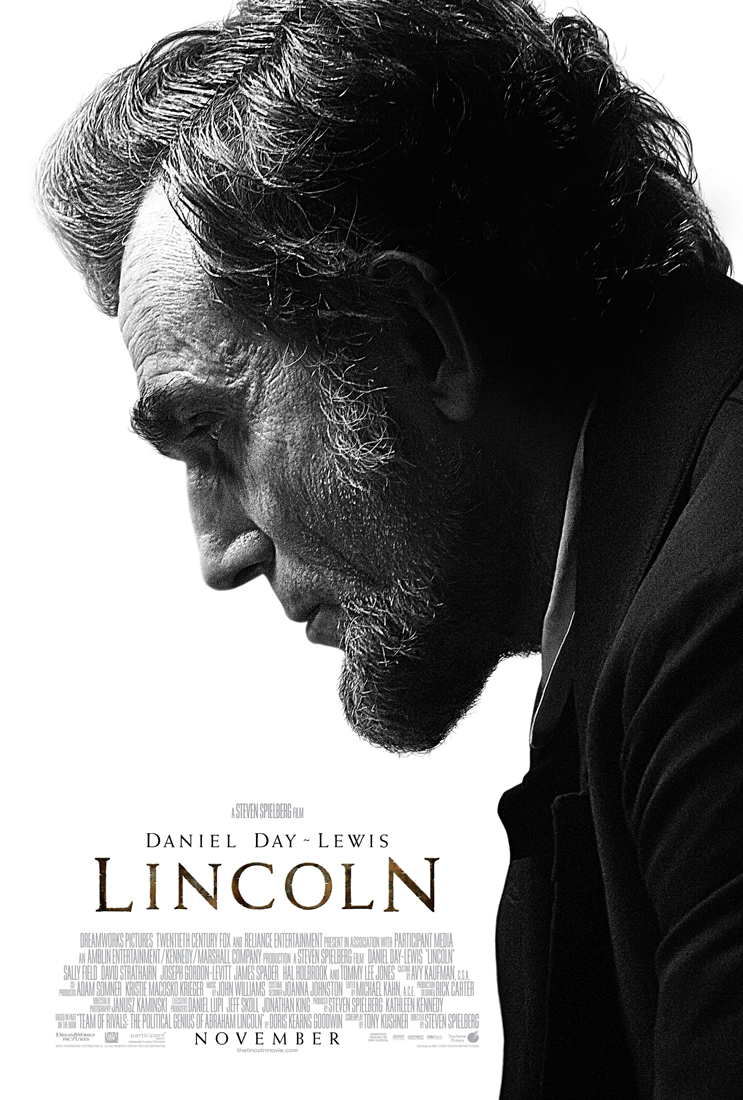daniel cohen reviews the presidential drama…
Plot: A look into the life of President Abraham Lincoln (Daniel Day-Lewis) as he tries to push through the 13th amendment to abolish slavery as the Civil War still rages on.
What we have here is director Steven Spielberg at his best, as well as his worst. But even with some of the directing deficiencies, it’s the screenplay and lack of strong supporting characters that derail this snap shot take on the 16th President. There are riveting dialogue scenes to be sure between Lincoln and what seems like a countless number of political big shots, but unfortunately the dry uninspired writing outweighs those gut wrenching speeches and debates that I was really hoping for. Now in analyzing this movie, it doesn’t take a genius to determine what the absolute highlight of this film was.
Daniel Day-Lewis as the title character is truly a great performance. He totally transforms himself, everything from his movement, dialect, facial expressions, yadda, yadda, yadda. His performance is worth the price of admission, and most certainly one of the best performances of the year. But I think because of the lack of strong writing, I wasn’t bowing down at his feet and being completely blown away like most are with a Daniel Day-Lewis performance. He’s great…but it’s probably not going to be my favorite performance of the year. Unfortunately, in a film with Sally Field, Tommy Lee Jones, John Hawkes, and Joseph Gordon-Levitt, Lewis’ performance was really the only one to write home about it.
The film is cluttered with so many political big wigs and movers & shakers, that everyone ultimately fell flat. I enjoyed it when Lincoln was able to have one-on-one time with some of these characters, but they were usually pretty dry conversations, with no sense of drama whatsoever. The one character dynamic I did really love though was between Lincoln and Secretary of State William Seward, played excellently by David Strathairn. Every scene between them was riveting, and added that drama I was looking for as Seward tries to guide Lincoln through critical points of presidency. And that’s what I wanted more of from the other characters.
But aside from the political confrontations that Lincoln has throughout the film, the family dynamic also doesn’t work. Sally Field as Mary Todd Lincoln was surprisingly mediocre and forgettable. But to be fair, this was really the writing’s fault. There’s one scene where she has a huge monologue, and Field is giving it her all, but the writing just isn’t there. It goes on and on, and you just start to tune out. Her scenes with Lincoln were boring and lifeless at times. They also add in a sub-plot with Levitt as Lincoln’s eldest son Robert, and his desire to join the Union army. Levitt elevated the material, but this was a completely underwritten and totally unnecessary storyline.
But the performance I disliked the most, and one that I think a lot of people will disagree with me on is Tommy Lee Jones as the eccentric Thaddeus Stevens, a powerful political leader who fights for the 13th amendment alongside Lincoln. It was an overacted performance. I don’t blame Tommy Lee Jones as much as I blame the direction though. His dialogue and humor was just to much, and the character almost becomes a cartoon, which actually leads me to one of the biggest flaws of the film.
The moments where this movie could have really shined is during the debates of the 13th amendment. But instead of great speeches and electrifying debates between all the state representatives and parties, they turned it into a light comedy where everyone acted like an excited teenager at an high school theater production. It was a lot of jokey comments, painfully over acted performances, and good ole fashion Spielberg schmaltz. It’s that type of humor that tries so hard to be charming, and John Williams’ score makes it even worse at times. It just creates a very uneven tone, because the film is very wishy-washy on whether it wants to be a serious look at one of Lincoln’s most challenging times, or a mere light-hearted take. It finally commits to a serious tone in the third act when the 13th amendment vote goes down, and this is where the movie starts to build tension and drama, even though we know what happens. And that is a great testament to Spielberg’s direction. But the first two acts desperately needed more Spielberg drama, and less Spielberg humor.
The movie also should have played more to it’s strengths, which is Daniel Day-Lewis. When looking at the film’s 150 minute run-time, Lewis’ screen time felt a little shortchanged. The best scenes in this movie are when it’s just him, and those quiet moments where Lincoln is simply reflecting. The best scene in the film is when Lincoln has to make a monumental decision about opening talks with Confederate leaders about peace talks. He sits quietly in the telegraph room as these two young messengers await his instruction, and Lincoln just starts opening up to them. These are the moments where you get to see who this guy is and the struggles he endures, and there just wasn’t enough of that.
Even with all the film’s problems and empty writing, the movie is worth checking out for Daniel Day-Lewis, which makes it that much more frustrating to see what he could have done with a great script. I was really hoping for something like 2008’s Frost/Nixon, which is just an edge of your seat political masterpiece, and infuses the humor at just the right moments. Lincoln is okay, but I’m still hoping for another great Spielberg flick which we haven’t seen since 2003’s Munich.


